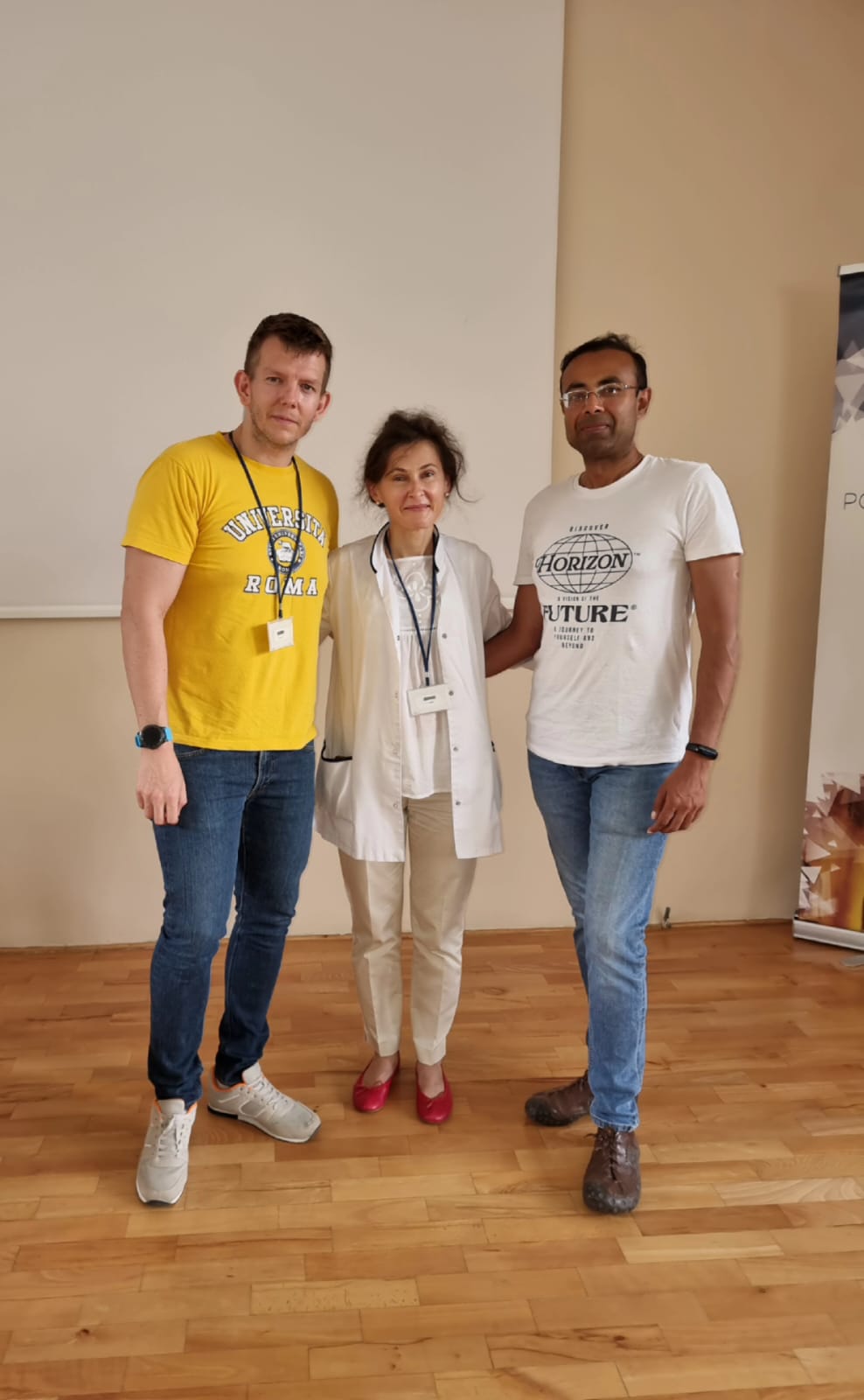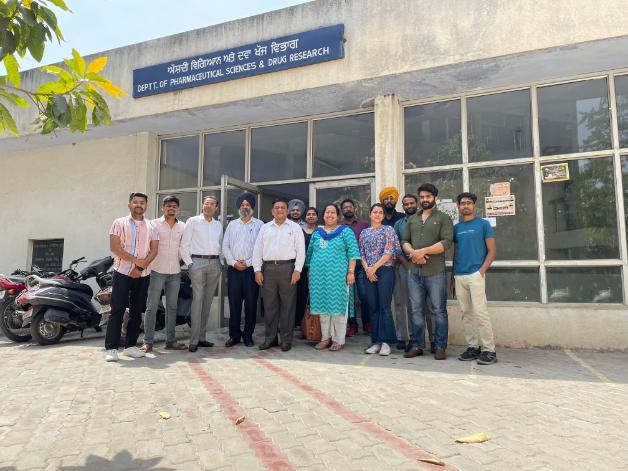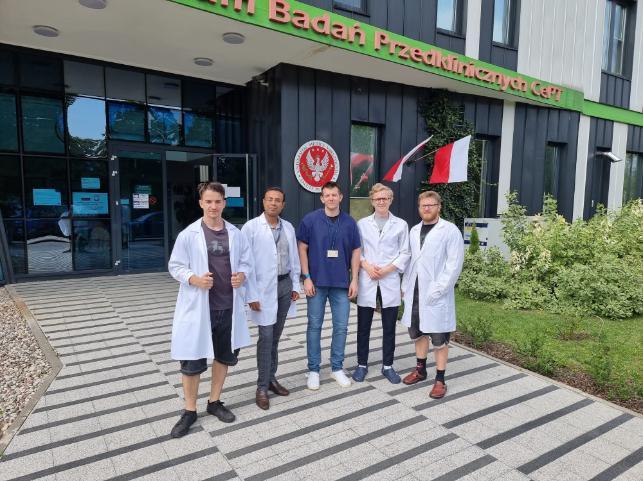Collaboration in research is the key to success

Dr Abhishek Gupta from the School of Allied Health and Midwifery blogs about how he is actively working on the hydrogels as advanced materials for chronic wound management and the importance of collaborating with international universities.
To maximise impact of my research, I recently visited the Medical University of Warsaw, Poland. During my visit, I worked with the team of scientists, doctors, and medical trainees to perform additional tests on the biosynthetic hydrogels that I produced, for their intended biomedical applications as advanced dressings, for wound management.
Dr Marek Konop and his colleagues at the department of Experimental Physiology and Pathophysiology, Laboratory of Centre for Preclinical Research, have the resources and expertise that assisted me in evaluating the effectiveness of my hydrogels in wound healing. Furthermore, I visited the department of Dermatology and met leading dermatologist and dermatopathologist, Dr Joanna Czuwara to discuss the challenges with chronic wound management and proprietary wound dressings commonly used in clinical practice for wound management. Dr Marek is working on keratin-based biomaterials for wound management and during my visit, we had discussions leading to innovative ideas and the scope of potential joint research project supervisions.
Back in April, I also visited the Punjabi University, India where I met with the Vice Chancellor Professor Arvind, faculty members and research students. Professor Arvind welcomed this active research collaboration and ensured the access to facilities within the department of Pharmaceutical Sciences and Drug Development, for this project. During this visit, we discussed skills and expertise at both the institutes which would be helpful in future development of these hydrogels as potential proprietary dressings.
Dr Dimple Chopra at the Punjabi University is actively working on developing nanocomposites for burn wounds and the hydrogels that I produce are a promising candidate for the management of these wounds. She, and her research group have successfully developed a burn wound model in rodents. In addition to other facilities, they have a well-equipped, dedicated, Committee for the Purpose of Control and Supervision of Experiments on Animals (CPCSEA) approved animal testing facility at Punjabi University, Patiala. During this visit, I demonstrated the production of biosynthetic bacterial cellulose hydrogels and introduced different type of hydrogels, with healing properties, which I produce here at the University of Wolverhampton.
I had meetings with MPharm and PhD students and had very productive discussions on advanced wound management approach. We discussed the benefits of bacterial cellulose over other hydrogels. Furthermore, I worked with project students to evaluate the efficacy of bacterial cellulose, loaded with natural healing agents, in burn wounds. Our active collaboration with Dr Dimple led to joint conference papers and contribution to a book chapter. Moreover, I am co-supervising MPharm projects with Dr Dimple Chopra, on wound management.
Also, I visited the cardiovascular (CVS) and neurosciences facilities led by Dr Nirmal Singh and had the opportunity to learn about student and faculty experiments across the department. They demonstrated ongoing research project on CVS related pharmacological investigations using Langendorff apparatus. In addition, Dr Nirmal’s team is actively working on neuropathic pain and Alzheimer’s disease and has made significant research contributions in cardiovascular research particularly on myocardial ischemia-reperfusion injury. His team is also exploring molecular targets to underline the protective mechanism of postconditioning in myocardial as well as cerebral ischemia-reperfusion injury.
During my visits to these universities, I came away feeling inspired and excited about the future of how we can work together to improve the lives of those living with chronic wounds. I can certainly say I have gained a new perspective in these complementary fields and have been amazed by the number of students who are also actively involved in these projects.
Development of Drug Delivery systems and Materials for wound management involves different stages. By combining resources and expertise at the University of Wolverhampton, Medical University of Warsaw, Punjabi University and our other collaborators, this would allow us to expand this project and become much more effective in achieving a positive result.
A special thanks to Professor Iza Radecka, Professor Gary Hix, Research Investment Fund (RIF), Faculty of Science and Engineering and School of Allied Health and Midwifery within Faculty of Education, Health and Wellbeing for supporting these visits. Collaborating with these international universities has been a huge benefit to not only my research, but to continue to educate myself further by working with inspiring colleagues and the next generation of life-changing medical experts.
Dr Abhishek Gupta has several national and international collaborations including the Medical University of Warsaw, University of Malta, Punjabi University and University of Birmingham. To find out more about Abhishek’s current research, click here.
For more information please contact the Corporate Communications Team.


/prod01/wlvacuk/media/departments/digital-content-and-communications/images-2024/Diane-Spencer-(Teaser-image).jpg)
/prod01/wlvacuk/media/departments/digital-content-and-communications/images-18-19/220325-Engineers_teach_thumbail.jpg)
/prod01/wlvacuk/media/departments/digital-content-and-communications/images-2024/240509-Menopause-Research-Resized.jpg)
/prod01/wlvacuk/media/departments/digital-content-and-communications/images/Maria-Serria-(teaser-image).jpg)
/prod01/wlvacuk/media/departments/digital-content-and-communications/images-2024/241014-Cyber4ME-Project-Resized.jpg)
/prod01/wlvacuk/media/departments/digital-content-and-communications/images-2024/240315-Research-Resized.jpg)
/prod01/wlvacuk/media/departments/digital-content-and-communications/images-2024/BDA-group-photo.jpg)

